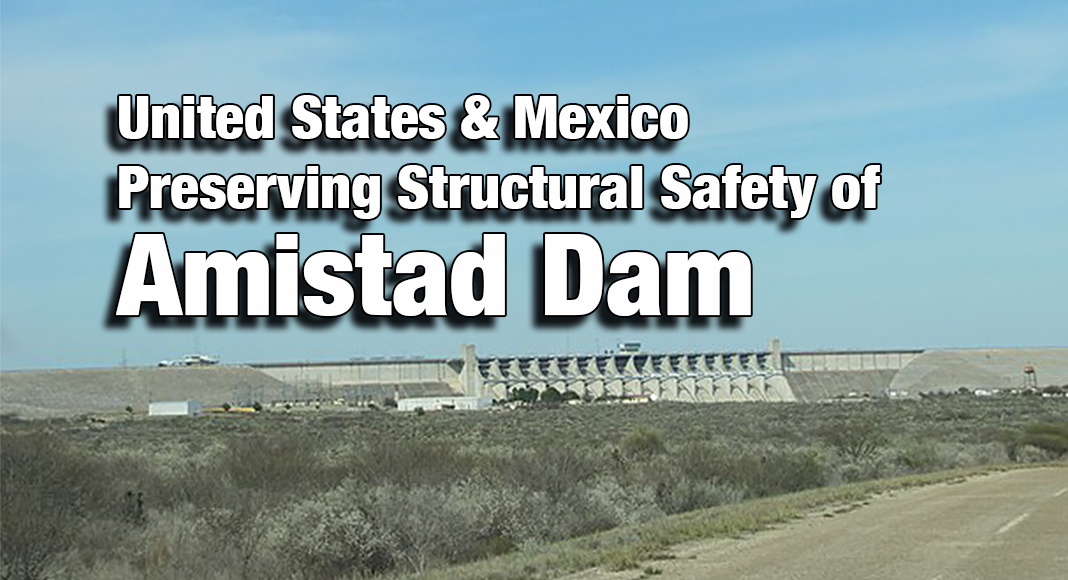
Texas Border Business
The United States and Mexico signed an agreement for a project to preserve the structural safety of Amistad Dam through the reinforcement of the Mexican portion of the dam’s earthen embankment in areas impacted by sinkholes and seepage.
Minute 332 of the International Boundary and Water Commission, United States and Mexico (IBWC), “Construction of a Composite Cutoff Wall to Reduce the Risk of Failure at Amistad International Dam,” was signed on December 10, 2024, in El Paso, Texas, and approved by the U.S. and Mexican governments.
According to Minute 332, the distribution of the total cost between the two countries for the design and construction of the 1.6-mile Composite Cutoff Wall will be carried out in accordance with IBWC Minute 210, in the same proportion that was used for construction of the dam: 56.2% for the United States and 43.8% for Mexico.
The design of the project started September 17, 2024, and once finished – tentatively in March 2025 – the solicitation process for construction will begin. The estimated construction time is 30 months.
More sinkholes and seepage have been detected on the Mexican side of the dam. Drought conditions and historically low storage levels have made it easier to detect these issues. To date, a total of 55 sinkholes have been identified.
“We are collaborating with Mexico on the technical expertise and cost involved in rehabilitating Amistad Dam,” said Dr. Maria-Elena Giner, P.E., Commissioner of the U.S. Section of the IBWC. “Experts from both countries determined the recent discovery of additional sinkholes was a cause for concern, but not alarm. We are continually monitoring the safety of this dam and will keep the surrounding area informed of the progress of this project.”
“From providing irrigation water storage to generating electricity, the Amistad Dam is a critical resource to South Texas,” said U.S. Sen. John Cornyn. “Every drop of water saved is vital to communities in the Rio Grande Valley, and I appreciate the IBWC for working to ensure areas of the dam impacted by sinkholes and seepage are restored.”
“I am pleased to see that Mexico and the United States have come to an agreement to rehabilitate the Amistad Dam,” said U.S. Rep. Henry Cuellar, a senior member of the House Appropriations Committee. “This critical project will ensure that water is stored securely as well as bolster an integral energy source in South Texas. Furthermore, the Amistad Dam is important for other activities including recreational and fishing opportunities. I commend Commissioner Maria-Elena Giner for her leadership on this project, and I appreciate the International Boundary and Water Commission and the work they do for Texas.”
“Amistad Dam is a crucial part of the Rio Grande’s water conservation infrastructure as it protects South Texas from the devastating impacts of flooding while also providing a supply of water for our municipalities, agriculture producers, and irrigation districts,” said U.S. Rep. Vicente Gonzalez. “I am pleased that this agreement was signed and that IBWC has begun the rehabilitation of Amistad Dam to ensure it can continue to operate and serve the Rio Grande Valley.”
“For the United States and Mexico and for IBWC, it is fundamental to ensure the safety of Amistad Dam,” Mexican IBWC Commissioner Adriana Reséndez said. “The design and construction of this important project is being done in a joint and coordinated manner between the two countries in order to ensure all the technical aspects inherent to it.”
Amistad Dam is located on the Rio Grande, approximately 12 miles north of Del Rio, Texas, and Ciudad Acuña, Coahuila, Mexico. The dam began operations in 1969 and its primary purpose is water storage. It also is used for flood control, electricity generation, fishing and recreational activities, and serves as an international port of entry. It is operated and maintained jointly by both Sections of IBWC.















